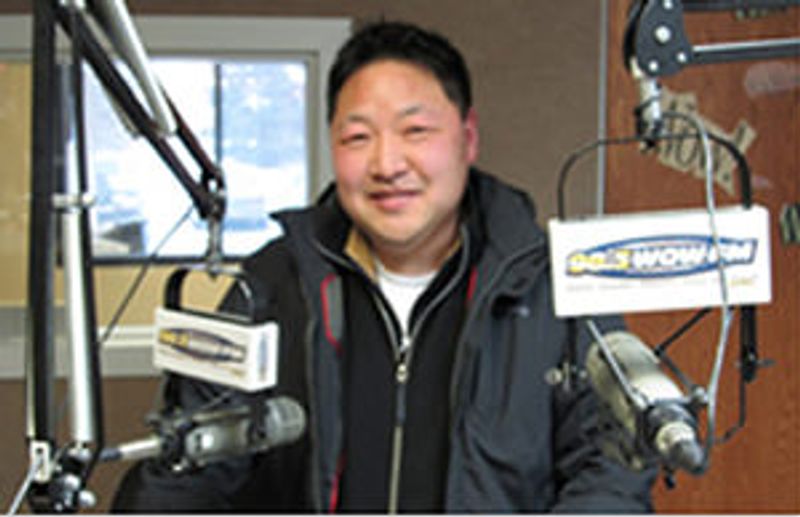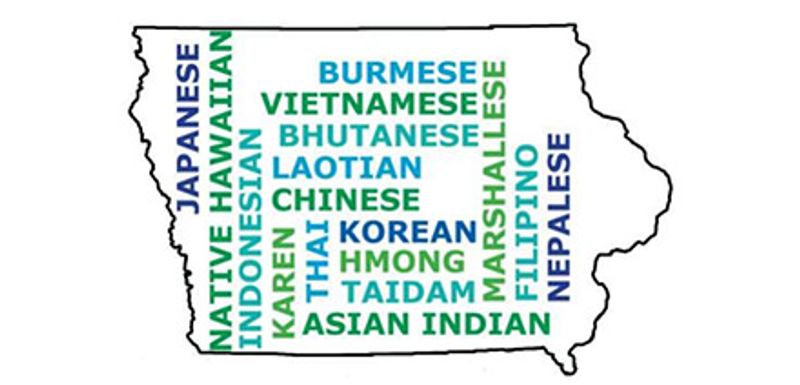Blog
Iowa? More than 90 percent white, but Asian Americans will caucus in Election 2016
Donald Trump not on the debate stage on Thursday night? Big deal. Neither was an Asian American.
But Asian Americans in Iowa are hoping to make some noise at the Iowa caucuses.
There are some Asian Americans there, you know.
You can’t tell from the street, but Ingersoll Wine and Spirits is not just a landmark on the main road in town–it’s Korean American to the core.
It’s part of a two store operation in Des Moines, Iowa, owned for nearly 30 years by the Jung family and now run by Ben Jung, 45, a Korean American and native-born Iowan.

He almost left it to do a typical Asian American thing.
“As many fellow Koreans know, our parents often push us to become doctors and lawyers,” he said. “I thought, If I’m going to get an education, I’m going to have to find somewhere else to go.”
He did so gradually, first a few hours away to the University of Iowa, then for graduate school in Washington, DC.
But ultimately, Jung came home to Iowa, where he’s watched the Asian American population climb from a micro-speck to a full speck and some–2.2 percent of the state (the nation is about 5.4 percent Asian), according to the latest Census data.
The state’s data center puts the actual number of people who say they are Asian at 63,291.
Imagine a fraction of the population of any big city Chinatown as its own state. That’s Iowa.
And it’s not just Chinese. Asian Indians are actually the largest group at 23.6 percent; then Chinese at 22 percent; Vietnamese, 10.9 percent; Korean, 8.8 percent; Laotian 8.1 percent; Filipino, 6.9 percent; Burmese, 5.6 percent; and “Other Asian” (including Taiwanese), 14.1 percent.

The state at more than 90 percent white isn’t so diverse. But the Asian American community sure is. And nearly 80 percent arrived since 1990.
It makes the native-born Jung kind of a go-to-guy in the state, and one of the state’s Asian American leaders. For the last four years, he’s been on the Iowa Commission on Asian and Pacific Islander Affairs, where he serves as chair.
Normally at this time of year, he’d be in California scouting the next vintage of fine wine.
This year, he stayed home for caucus season to sample the campaign whine.
In June, he thought the Trump phenomenon would peter out by January. Now, he’s resigned to say Iowa is likely to go Trump or Cruz. But generally, he’s been disappointed by the discourse and the anti-immigrant, anti-Obama attack-style rhetoric he’s heard.
And he’s a registered Republican.
“I feel like we don’t have a bleeding heart conservative, and that’s kind of gotten us lost,” he told me wistfully. “I almost wish there was a Jack Kemp of the 21st Century.”
Jung recalled how in 1988, Kemp, the former HUD Secretary and frequent presidential candidate, visited Jung’s high school.
“We’re known to be the anti-immigrant party,” Jung said of the GOP. “And I don’t feel like that’s the true party, based on what I remember back then meeting Jack Kemp…I look back and think, why can’t we have someone like Kemp who doesn’t apologize for tackling issues like poverty…Those voices are being drowned out because in primary season, it’s easier to boast your conservative credentials and oftentimes that means how fast we can secure the border, for example, or how we can keep out refugees.”
Jung remembers how meeting Kemp in the 1988 campaign influenced him so much he attended his first caucus as a high school student.
The rhetoric, while strong, isn’t keeping him away from attending his precinct caucus this time around.
He said he has friends supporting Marco Rubio and Jeb Bush. This is the community fun of Iowa politics during caucus season. Jung says he’s accepted the new reality and the trend of embracing outsider, anti-establishment candidates.
But Jung’s pick is an odd one: former congressman Rick Santorum.
“He’s conservative,” Jung said. “But he’s not strident…He doesn’t fit my personal view on immigration, but I’m trying not to be a one-issue caucus goer. . .I just feel like when I show up Monday, I’ll speak for my candidate and say, you can be conservative but you don’t have to be name-calling and strident; that’s what Trump and Cruz represent.”
Jung hopes others get energized enough to participate. “To be vocal and be visible,” said Jung. “I’m doing my part as an Iowan. But I’d like to see others do so too.”
He was especially critical of his own Republican party.
“They’re not doing enough,” Jung said. “The Republican Party of Iowa has done very little.”
He was concerned that the Brown and Black Forum, held every year for both Democrats and Republicans, only had a Democratic version this year. The Republican event was cancelled in the fall and never rescheduled.
“The Republican Party of Iowa seems to be happy it didn’t happen,” Jung said.
Ironically, it’s a status quo mindset in the midst of a campaign known for its anti-establishment feel.
It’s just status quo to be slow to acknowledge diversity.
The Asian growth in Iowa is up 72.8 percent since 2000.
Jung says every time there’s a mock caucus training for Asian Pacific Islanders, people show up.
But he says because of lack of outreach by the Republicans, he estimates that more than half of all Asian Americans who can will be going to Democratic caucuses and not Republican ones.
“It’s a missed opportunity for the Republicans,” Jung said. “This is going on in our back yard. But they’re keeping the blinders on.”
That’s modern minority politics in Iowa. But change is happening. In 2016, Ben Jung assures there will be Asian Americans caucusing.

Emil Guillermo is an independent journalist/commentator. Updates at www.amok.com. Follow Emil on Twitter, and like his Facebook page.
The views expressed in his blog do not necessarily represent AALDEF’s views or policies.
Read Emil's full bio →